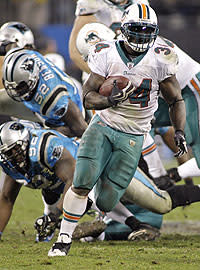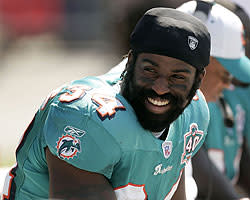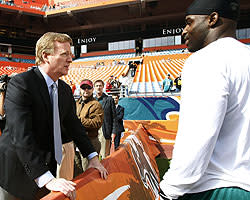Williams' journey leads to tremendous growth
MIAMI GARDENS, Fla. – So Dennis Rodman crashed Ricky Williams'(notes) wedding party in September.
Right now, imaginations are tumbling across the Internet. This is the start of a story that could have any number of punch lines, featuring two guys who are perceived by many to be the latter day Cheech & Chong. Fact is, most people at the party feared some Rodmanesque ending as the wildman/former basketball player/celebrity started drinking.
When Rodman finally got his chance to give a toast, the crowd cringed in anticipation.
What they got was a poignant address as the slightly tipsy Rodman became introspective. After a quick hint about their old days together running through clubs on South Beach, Rodman congratulated Williams for finding something Rodman had never found: Peace, contentment and, dare we say, structure with long-time girlfriend Kristin Barnes.
"It was probably the best, most heartfelt toast of the night," said Sean Pamphilon, who has been chronicling much of the Miami Dolphins running back's life the past six years for the film "Run Ricky Run" that will debut on ESPN on April 27 as part of the network's "30 for 30" series.
More than anything, Rodman's toast might have been the most accurate. Williams, who has literally spanned the globe chasing his curiosity and feeding his desire for experience, has seemingly reached a point in his life that no one might have imagined years ago. He is like some character from a Bob Dylan or Warren Zevon song who has come back from the wandering, better for the experience and satisfied with the outcome.
"Everyone in life evolves. It's like breathing. You just do it," said Williams, who turns 33 in May. "You can't get away from it, everyone evolves. One of the main characteristics as people is our ability to adapt to a new circumstance."
Such an occasion was Good Friday, when Williams partnered with Publix Supermarkets to give away more than 300 Easter meals to needy families. As the families lined up, and Williams and 11 other Dolphins players readied to help, long-time team security advisor Stu Weinstein was asked if he could have imagined this moment six years ago. Weinstein was there in 2002 when Williams came to Miami and rushed for 1,853 yards, putting together one of the best seasons by a running back in NFL history.
Weinstein was also there in 2004 when Williams "retired" before he could be suspended by the NFL for drug use. It was the beginning of a string of lost years for Williams and the worst stretch of embarrassment in team history.
It's a situation that defies an easy explanation and Weinstein didn't have to say a word to get that across. His smiling guffaw said it all.
Williams was the dreadlocked, pothead face of Miami's ineptitude. His suspensions added to the amusement and/or frustration, depending on your perspective. Now, only two days before Easter of all holidays, he has almost become the on-field face of the team's resurrection (or at least return to respectability). Even as primarily a backup running back these days, he is perhaps the most recognizable and consistent person the Dolphins currently have on the roster.

Williams' 2009 season high of 119 rushing yards came against the Panthers in Week 11.
(Rick Havner/AP Photo)
Despite starting only the final seven games last season, Williams rushed for 1,121 yards. Even at his advanced age as an NFL runner, his 4.7 yards per carry average and 11 rushing touchdowns were both the second-best marks of his career. He also set an odd NFL record by going six years between 1,000-yard seasons.
Williams' arrival to this point of his life, let alone his career, is fascinating. For those who have been able to watch it from even arm's length, it has been a privilege to observe, even if it's sometimes really frustrating to understand.
Who is this person?
From 1999 to 2004, Miami Herald columnist and South Florida radio personality Dan LeBatard had developed a strong friendship with Williams, who had been acquired by Miami in a trade with the New Orleans Saints on March 8, 2002. LeBatard had been privy to Williams' life to an extent few reporters and subjects ever get. They talked constantly and honestly, leading to news stories and features of tremendous depth.
In July 2004, that ended when LeBatard reported that Williams was retiring, LeBatard putting the responsibility of his job ahead of role as friend. At first, the story was about how Williams had lost passion for the game after setting an NFL record by carrying the ball a meat-grinding 775 times over the previous two seasons.
Then came the news that seemed to ring more to the point to the general public: Williams was about to be suspended by the NFL for violating its drug policy after testing positive for marijuana multiple times in the 2004 offseason. If Williams' retirement didn't bug people enough, his perceived lie about the reasons made it worse.
As a result, Williams and LeBatard's friendship ended for the next five years. There was still some connection. LeBatard would often help Kristin take care of the first two children she had with Williams (she gave birth to their third child in March) when Williams was somewhere around the world. Be it Australia, where he lived in a tent for months and almost became an expatriate, or in India, when he lived in an ashram for a month, or a brief trip to Japan for a rock concert, Williams was everywhere.
But until LeBatard got an invitation to Williams' wedding, the friendship was gone, the two walled off in silence. When they finally talked, LeBatard found the moment cleansing.
"I owned up to my [expletive] and he owned up to his [expletive]," LeBatard said.
In the months since, LeBatard has seen a distinct change in the person he knew so well before.
"I don't know if maturity or responsibility is the right word or if it's growing up or whatever you want to call it. But I think he's at a place in his life where he's more focused and he really knows what he wants. A lot of the time, he's just home meditating, just being with the family. I think he sees how important it is for his kids to have something he never had."
Williams echoed that sentiment as his oldest children, son Prince and daughter Asha, happily bounced around him in typical father-child fashion. The marriage has given his kids more stability and Williams sees the value is that traditional bond.
"I think they like it," said Williams, the 1998 Heisman Trophy winner from Texas. "I didn't have it when I was a kid, but I see the advantages they have, having the support in the house. I think it's good for them."
More than ever in his life, Williams seems to see beyond himself. When he was diagnosed with a social anxiety disorder earlier in his life, he also was told he's a narcissist. He seems to have grown out of that.
"He was always very focused when it came to football, but everything else was all over the place, a mess," LeBatard said. "Now, he's focused on everything he's doing. … He is a very different person. If we're meeting somewhere and he's going to be late, he'll actually call and tell me he's going to be late. He never did that before. I hang up the phone and think, 'Who is this person?' "
Kristin has noticed the evolution as well. Last month, Williams was one of the two Dolphins players to attend the NFL Players Association meeting in Hawaii, a crucial meeting as the union discussed its strategy for the ongoing negotiations with the owners.
Beyond showing an interest in union matters, Williams returned home a day early to make sure he was there for the birth of his latest child. In between trips to the hospital and fighting a jet lag-induced cold, Williams attended his three classes at Nova Southeastern University, where he's working toward his bachelors degree on the way to becoming a doctor. He also wrote three papers.
"If you told people that about Ricky, that he's seriously working toward becoming a doctor now and being a good father, you'd probably get a lot of funny looks," Kristin said with equal parts satisfaction and weariness in her. Being Williams' friend is both joy and frustration.
It's not exactly the picture conjured up by the term "America's Pothead" from the ESPN press release about the film.

Williams smiles from the sidelines in his first return to the NFL on Oct. 16, 2005.
(Marcio Jose Sanchez/AP Photo)
The truth is that Williams has been a lot of different people over the years. His football career has had more stops and starts than Manhattan traffic. He sat out the entire 2004 season and then was suspended for the first four games of the '05 season. He missed all of the 2006 NFL season (he played for Toronto of the CFL that year) after being suspended for what was at least his fourth violation of the league's drug policy. The suspension extended through 10 games of the '07 season. He then missed the remaining five games after tearing his right pectoral muscle.
But over the past two seasons, under the eye of vice president of football operations Bill Parcells, Williams has seen his career get back on track. Really, he's on a track no one in the NFL has ever really seen.
Beyond football, he has studied philosophy voraciously, from Christianity to Eastern religion to numerology. He was reading "The DaVinci Code" before it was popular. He has gone from using medication to deal with anxiety to self-medicating with recreational drugs to finding a drug-free life while studying yoga in an ashram in the foothills of the Sierra Mountains in California. He went through months of drug rehab in Boston after the 2006 suspension. He has also dealt with the anxiety of having two other children with two other women besides Kristin.
Through it all, Williams has pushed the relationships of those closest to him, including those of Kristin and his mother, Sandy Williams. On Good Friday, as he gave out boxes filled with turkey, ham and the rest of the fixings to those who live in desperation, Kristin and Sandy stood to the side and watched a man who has rarely done things conventionally.
"Has it been an adventure?" Kristin said, repeating the question with a tone that gave away the answer. "It's strange, because as much as it might have been scary to go through it, going from one place to the next on short notice, I look back on it and think about how much I enjoyed it. The only thing I look back on is that I wish we had more time in some of the places we ended up so that we really could have enjoyed them."
In the dark
Pamphilon's journey following Williams has taken him many places, literally and figuratively. From trips to Boston, Miami, San Diego, Austin, Texas, little towns in Northern California and even Canada, Pamphilon has chased Williams, rarely finding the most cooperative subject.
Williams would never stage shots or do sit-down interviews. He wanted the whole experience to be as natural or "organic" as possible.
"He was very much into the idea of flow and that can be disconcerting to a filmmaker," Pamphilon said. "As we went along, I found that the less things I wanted him to do, the less resistance I got."
Pamphilon would often set up cameras at spots where he knew Williams would be at certain times, like at the front door or by the phone. The problem was that it didn't allow for a lot of preparation and the result is that some people believe the film is very dark.
"I really think it's more natural," Pamphilon said.
What's clear is the Williams at the beginning of the film is much different than the one at the end.
"At the beginning, I think you clearly see a person who is much less confident on where he's going," Pamphilon said. "He has always been analytical about what he's doing and why, but he's much less impulsive. … Ricky is someone who values self-improvement a lot.
"We didn't have interviews as much as we had conversations. He made me examine a lot of decisions myself about my own life and I think that's the value of my experience with him."
For instance, Pamphilon quit smoking cigarettes the day that Williams was suspended for the 2006 NFL season. He had smoked for roughly 12 years and sometimes looked anxious when he was smoking. He now calls it "a foolish thing."
More than anything, Williams wanted the film to be truthful, even if that meant people being critical of him. That comes across to him. When asked about the film, Williams said: "I don't really have anything I'm getting from it. My thing is I have enough distance from it that I think it's interesting and people will learn about me, hopefully about themselves. … It made me kind of squirmy. There's some uncomfortable stuff in there. But, like I said, it's kind of interesting."
It's just as interesting to watch Williams' growth today, when he has a corporate sponsor by his side as he hands out boxes of food with his wife, three children, mother and other friends and family members watching.

Williams talks to commissioner Roger Goodell before last season's finale.
(J Pat Carter/AP Photo)
"Any situation when people come to me and ask me for assistance, I'm going to help them. I'm in a position where I make enough money and can have a lot of impact," said Williams, who has always been charitable, though sometimes to the point of reckless. Williams would often hand out hundreds of thousands of dollars to needy schools at times when he needed to be a lot more careful with his finances.
It was the sign of a good heart, but not always an effective one. On Good Friday, Williams used his presence to gain the help of a bigger company to foot a good share of the bill. Again, in some small way, it was the sign of a wiser man. Rather than tilt against the norms of society, Williams is now massaging them.
"I really wasn't sure about doing a big production like this, but when I realized how much help I could get and how many more people I could help like this, I jumped at the opportunity," Williams said.
So does this mean the man known for his journeys is putting down roots? After all, he's been the human version of a lily pad.
"I don't want to say roots because I don't think I'm going to be here when I retire," Williams acknowledged. "But I do want my presence to be felt more than just on the football, inside the community.
"I wouldn't say I wasn't ready [to do this type of event six years ago]. Well, I guess I could say that. It just wasn't that important to me back then. Now, I think I have a different perspective. I really believe now that the more you give, the more you receive. I truly believe that."
